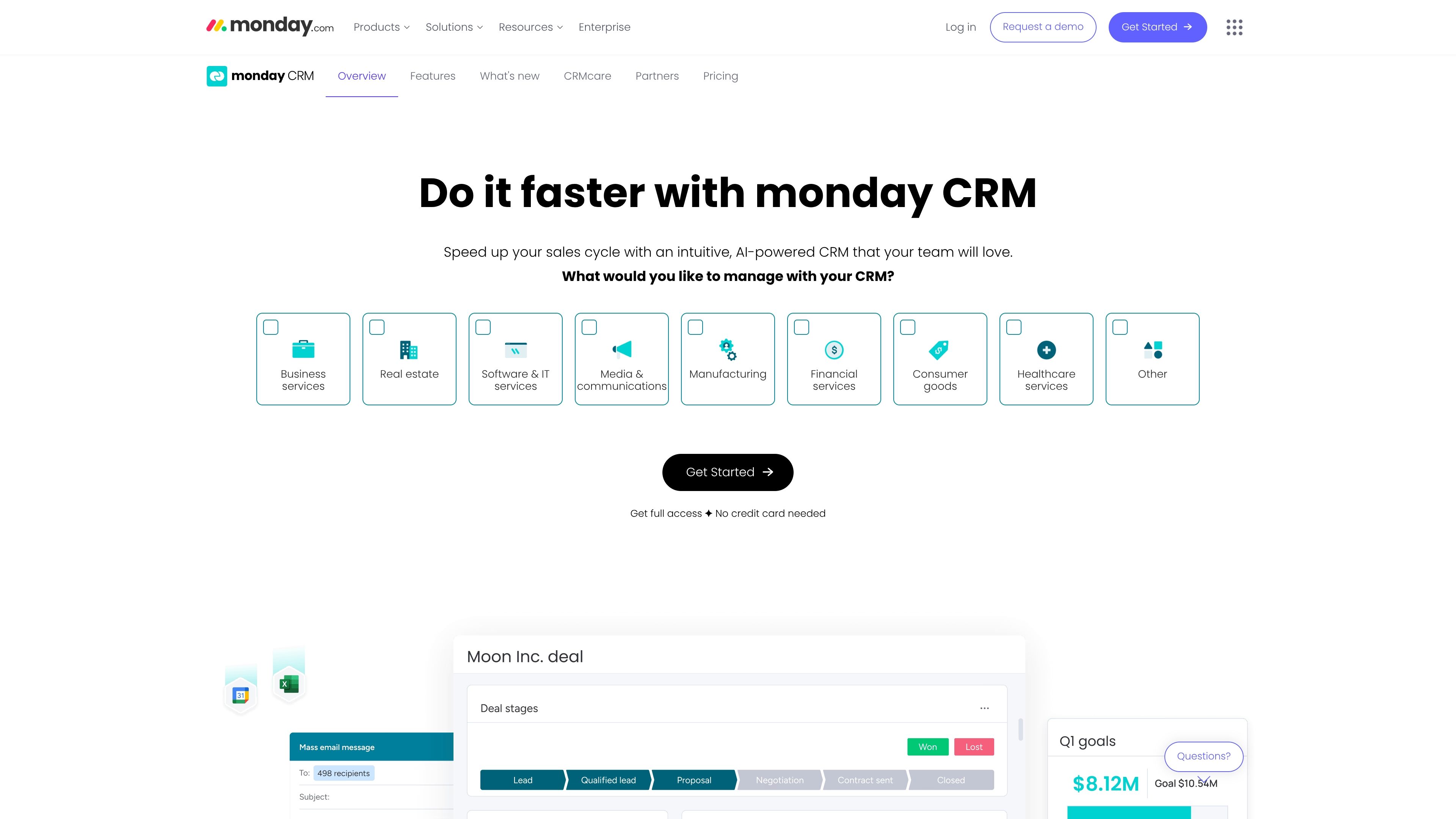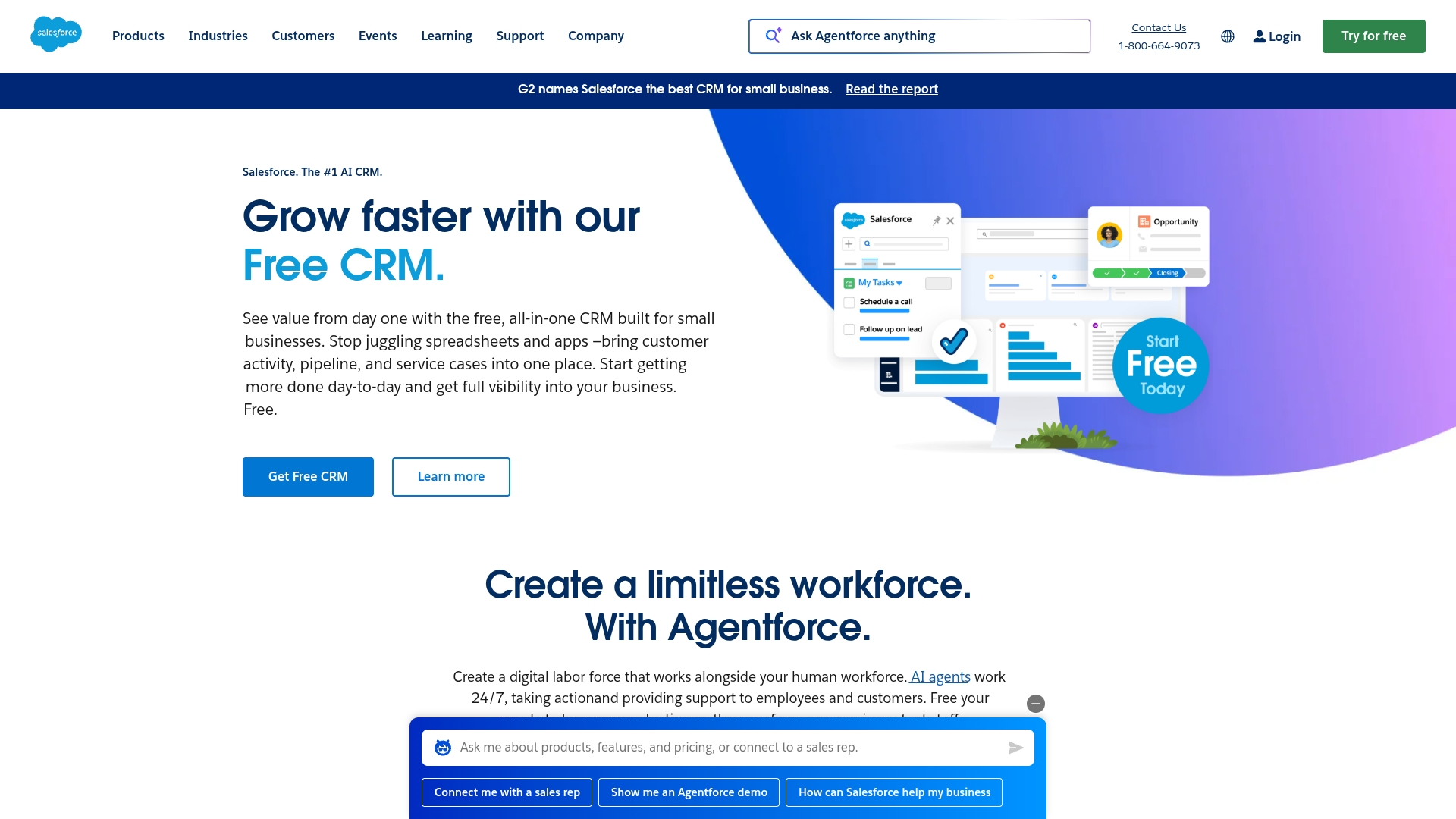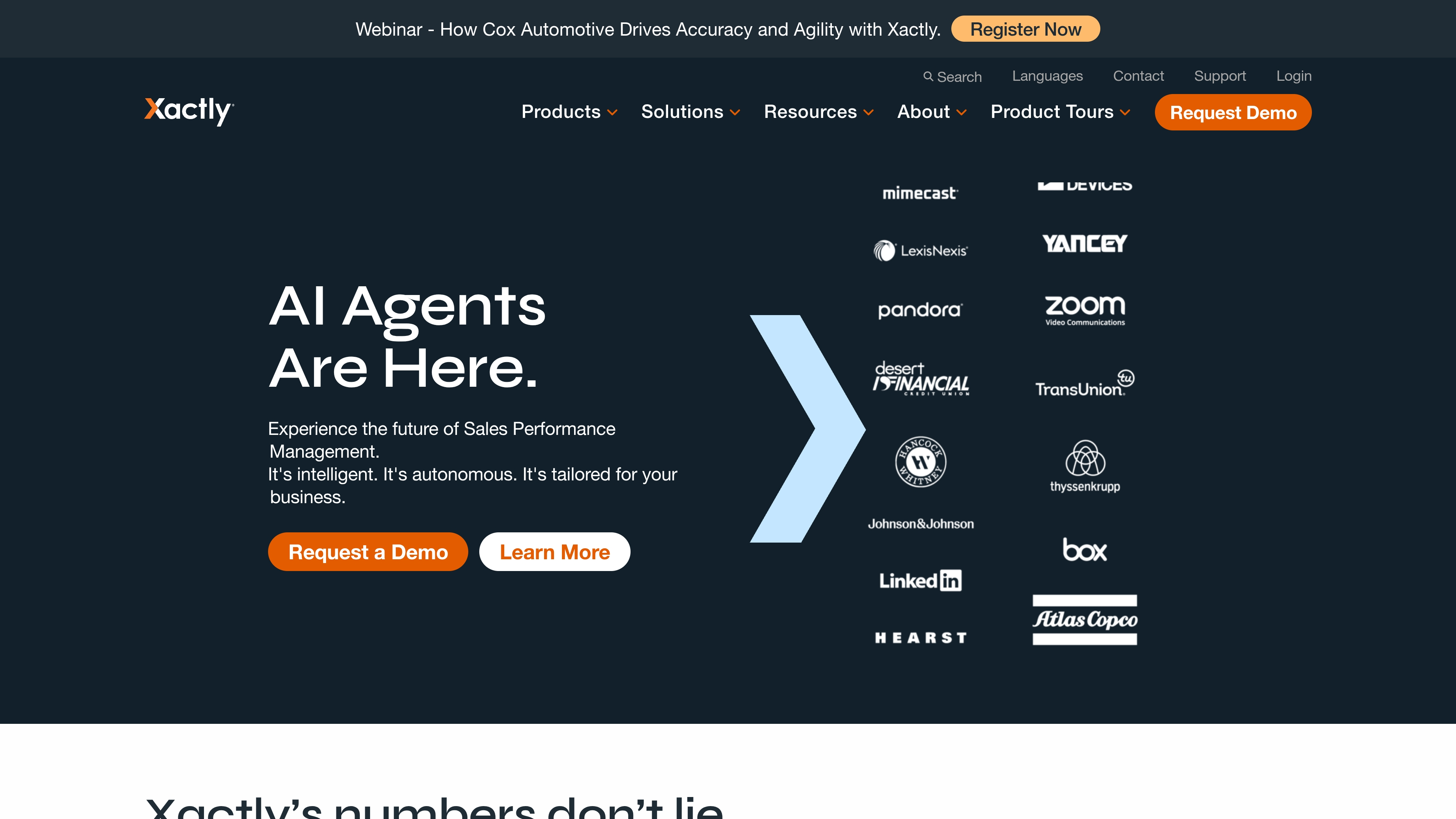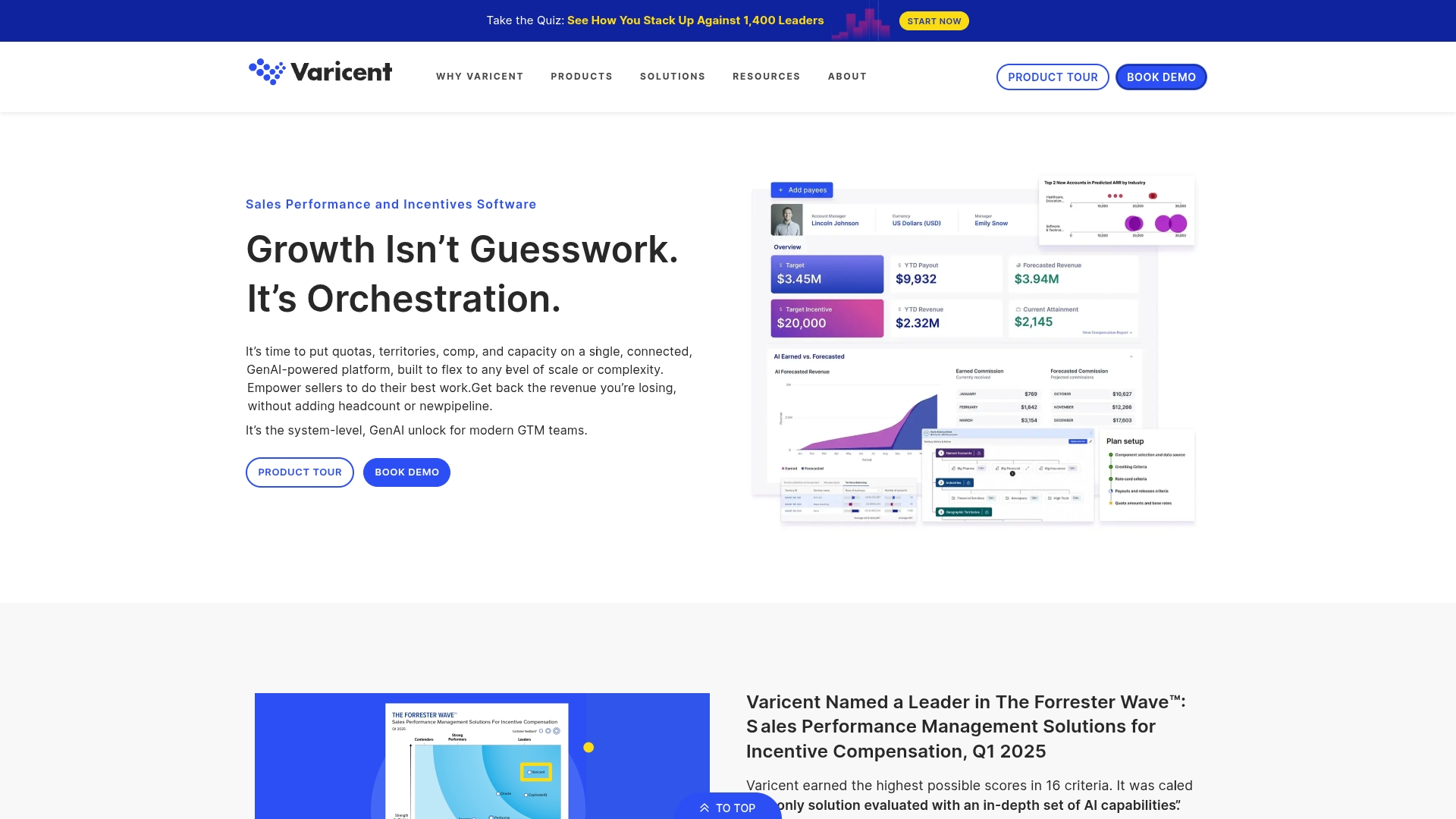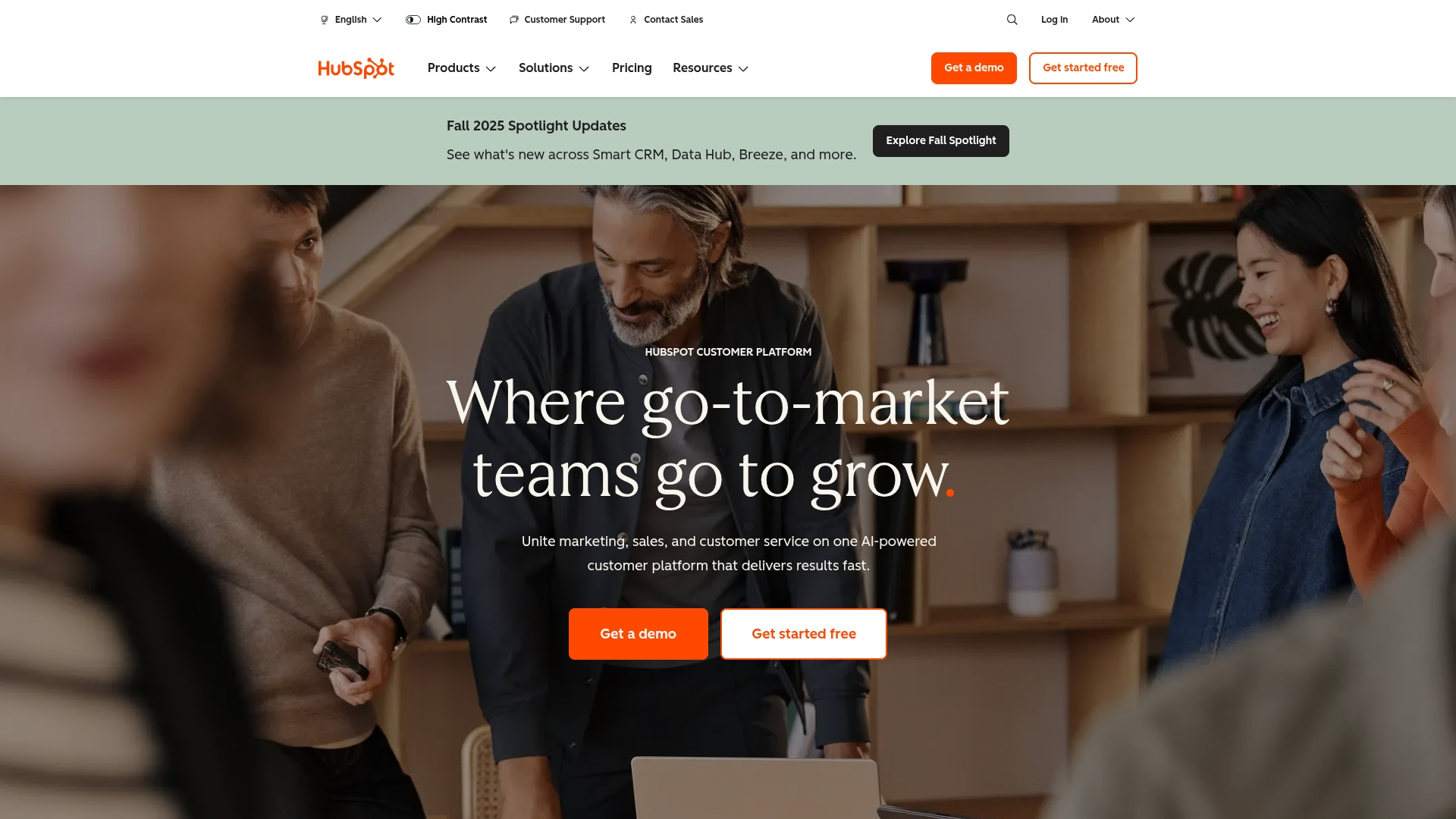Sales performance thrives on clarity — and it disappears when key data like quotas, commissions, and pipeline insights are trapped in different systems. Fragmented tools slow progress, obscure real performance, and leave teams guessing at what drives results.
Sales performance management software brings everything together. It links goals, incentives, and execution in one connected view, replacing manual tracking with automated accuracy. When every rep can see exactly how their work contributes to team success, accountability becomes effortless and motivation skyrockets.
This guide breaks down the essentials of modern SPM software, from core features to the role of AI in driving performance. Below, you’ll find a clear comparison of the top platforms for 2026 to help you choose the one that aligns with your goals and empowers your sales team to consistently outperform.
Key takeaways
- Align every target with impact: connect individual sales quotas, commissions, and performance metrics directly to company goals, creating a single, accurate source of truth for sales performance.
- Focus on execution, not admin: automation streamlines manual tasks like territory assignment and commission tracking so teams can dedicate their time to building relationships and closing deals.
- Lead with insight, not guesswork: top platforms deliver real-time forecasting, commission visibility, and territory management tools that give leaders the clarity to coach more effectively.
- Unify your systems with monday CRM: integrate SPM data directly into monday CRM to link goals, deals, and performance insights in one connected workspace that keeps teams aligned.
- Turn AI into a competitive advantage: leverage AI to identify at-risk deals, highlight top opportunities, and transform reactive reporting into proactive, data-driven strategy.
What is sales performance management software?
Sales success requires a clear view of the field. SPM software provides this, acting as a digital coach with a real-time, unobstructed view of individual stats and the overall scoreboard. It transforms your process from guesswork into a robust data-driven strategy.
An SPM platform is the single source of truth, effortlessly connecting individual targets and often complex commission plans to the big picture. It automates admin and clarifies goals, empowering reps to focus entirely on closing deals.
Platforms like monday CRM are engineered to be this ultimate, flexible performance tool, providing the precise visibility and control you need to coach your team to success and crush their goals.
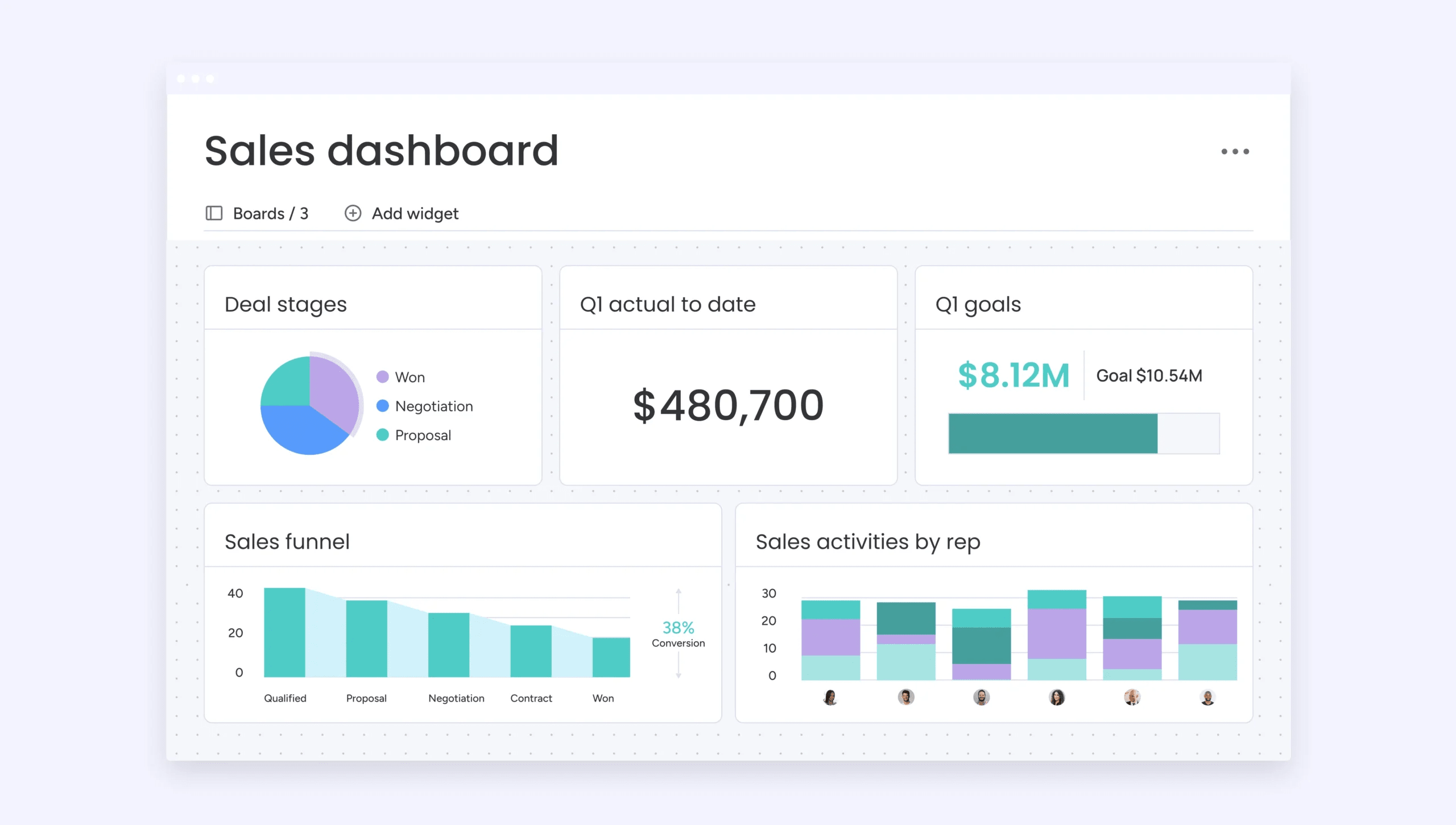
Key features in a sales performance management platform
An effective sales performance platform serves as the central nervous system for the entire revenue team, going far beyond simple logging. It provides leadership with the critical visibility to identify success and the operational controls to amplify those efforts. By converting complex data into an actionable roadmap for growth, the platform ensures teams move past guesswork, executing with confidence and precision.
Here are the game-changing features that automate busywork, giving teams back precious time to focus on what really matters: building relationships and closing deals.
- Territory and quota management: automated territory assignments based on geography, accounts, or revenue potential.
- Incentive compensation tracking: real-time commission calculations with compliance reporting.
- Sales forecasting and pipeline analytics: predictive insights for revenue planning.
- Performance dashboards: customizable views for individual reps and management teams.
- Integration capabilities: seamless connection with existing CRM, ERP, and marketing platforms.
- Mobile accessibility: field sales support with offline capabilities.
| Feature category | Specific functions |
|---|---|
| Planning | Territory assignments, quota setting, sales forecasting |
| Tracking | Real-time activity monitoring, commission tracking |
| Analytics | Pipeline analysis, performance dashboards, reporting |
| Automation | Workflow automation, AI-driven insights, integrations |
Top platforms for sales performance management
Selecting the optimal sales platform is a pivotal strategic decision for any revenue organization. The ideal system must function as a true performance partner, eliminating technical hurdles and providing the granular visibility necessary to consistently exceed targets. Crucially, the technology should work for the team, not the other way around.
The market offers a broad spectrum of solutions, ranging from large enterprise systems to specialized niche tools. The strategic key is identifying a platform that fosters alignment and energizes the sales team from initial lead to final close, effectively blending powerful insights with streamlined automation.
Modern platforms like monday CRM are engineered to deliver exactly this flexibility and power, while stripping away unnecessary complexity. Instead of teams struggling with rigid software and lengthy implementation, they gain a system that quickly molds to their unique sales process. This centralization and automation frees the team, making them more confident, connected, and focused solely on revenue generation.
1. monday CRM
monday CRM helps transform sales performance management by combining visual pipeline tracking with powerful automation and AI insights to help teams close more deals faster. The platform specializes in customizable workflows and real-time visibility, making it a great fit for sales teams who want to ditch manual tasks while keeping complete control over their sales process.
Example: monday CRM serves as a comprehensive sales performance management solution that centralizes lead tracking, automates follow-ups, and provides real-time insights to help sales teams increase productivity and close rates.
Key features:
- AI-powered sentiment analysis and predictive analytics: to help identify at-risk deals and forecast outcomes.
- Visual pipeline management: with drag-and-drop functionality for tracking deals through customizable sales stages.
- Automated workflows: that handle follow-ups, lead assignment, and deal progression, with customizable lead scoring to help prioritize prospects.
Pricing:
- Basic: $12/month per seat, 1,000 active contacts & deals.
- Standard: $17/month per seat, 10,000 active contacts & deals, AI automations, AI writing, AI columns.
- Pro: $28/month per seat, unlimited contacts & deals, AI automations, AI writing, AI columns, SDR agent, AI web search & research, Premium AI models.
- Enterprise: custom pricing, everything in Pro, plus comms analysis & alerts.
Why it stands out:
- Unified Work OS: combines robust project management DNA with CRM functionality, creating a unique Work OS that seamlessly connects sales activities to broader business operations across the organization.
- No-code automation: features a no-code automation builder that lets sales teams create powerful, custom workflows and system integrations without requiring technical expertise or reliance on IT resources.
Superior visual interface: makes pipeline management clear and simple, which significantly reduces training time and accelerates user adoption across all sales teams.
2. Salesforce
For large organizations with complex sales processes and substantial technical resources, Salesforce provides an enterprise-grade SPM solution natively integrated within its comprehensive CRM ecosystem.
The platform specializes in connecting sales planning, territory management, and incentive compensation.
Example: Salesforce’s SPM suite connects customer data directly to sales planning and execution, enabling organizations to automate complex commission workflows while maintaining a unified view of sales performance across all touchpoints.
Key features:
- Automated incentive compensation management: with real-time commission visibility and ASC 606/IFRS 15 compliance reporting.
- AI-powered territory planning: with optimization engines that balance coverage and automatically assign accounts based on CRM data.
- Integrated sales planning: connects quota setting, resource allocation, and performance tracking within the existing CRM workflow.
Pricing:
- Pricing ranges: from Starter Suite to Agentforce one Sales with increasing functionality levels.
- Add-ons: some SPM components like Salesforce Maps and Spiff.
- Pricing information: contact Salesforce.
Considerations:
- Implementation complexity: often requires specialized technical expertise and can be time-intensive for full deployment.
- Cost structure: can become expensive when combining multiple SPM modules, particularly for smaller organizations with limited budgets.
3. Xactly
Leveraging over 19 years of proprietary pay and performance data, Xactly’s AI-powered Intelligent Revenue Platform offers a comprehensive approach to SPM, unifying incentive compensation, territory planning, and sales forecasting. It is ideal for enterprise organizations seeking data-driven revenue optimization.
Example: Xactly helps enterprise sales organizations automate complex commission calculations, optimize territory and quota planning, and drive predictable revenue growth through AI-powered insights and benchmarking.
Key features:
- Automated incentive compensation management with 99.8% payout accuracy
- AI-driven territory and quota planning with real-time optimization
- Advanced sales forecasting using machine learning and historical performance data
Pricing:
- Custom pricing: based on specific organizational needs and requirements.
- Fixed pricing tiers: not available publicly.
- Free demo: available upon request.
Considerations:
- Complex initial setup process: may require significant IT resources and technical expertise.
- Steep learning curve: with some customers finding the interface less intuitive compared to newer competitors.
4. Varicent
Varicent’s AI-powered platform unifies planning, incentives, and insights, specializing in handling complex compensation calculations and large-scale deployments for mid-market to enterprise organizations. The solution is designed for companies with intricate sales structures.
Example: Varicent helps organizations orchestrate their entire revenue journey by connecting sales planning, territory management, quota assignments, and incentive compensation in a single platform that drives sustainable growth.
Key features:
- AI-powered incentive compensation management: with complex calculation capabilities including clawbacks and pipeline-based earning projections.
- Unified territory and quota management: with visual design tools and strategic alignment features.
- Real-time sales performance analytics: with predictive forecasting and “what-if” scenario modeling.
Pricing:
- Custom pricing: upon request.
- Tailored quote: connect with Varicent team for a consultation.
Considerations:
- Steep learning curve: for users without technical backgrounds, particularly for advanced data models and reporting.
- Interface issues: has been described as “clunky” by some customers and may require significant training and onboarding to unlock full platform capabilities.
5. HubSpot
HubSpot integrates sales performance management directly into its all-in-one platform, combining CRM, analytics, and coaching tools to make complex sales data accessible for growing businesses. Its user-friendly dashboards and automated reporting provide powerful insights without technical complexity.
Example: HubSpot’s Sales Hub provides real-time performance analytics and coaching insights that help sales teams identify top performers’ strategies and replicate them across the entire organization.
Key features:
- Pre-built and custom sales reports: with AI-powered insights for pipeline tracking, forecasting, and team performance analysis.
- Integrated conversation intelligence: records and transcribes sales calls for coaching opportunities and performance improvement.
- Automated sales workflows and lead scoring: prioritize high-value prospects and streamline follow-up processes.
Pricing:
- Tiered pricing model: for Sales Hub, including a free CRM with basic tools.
- Paid plans: (Starter, Professional, and Enterprise) scale in features and cost, unlocking more advanced capabilities at each level.
- Pricing information: visit HubSpot’s website.
Considerations:
- Cost at scale: advanced sales performance features are locked behind higher-tier plans, making the platform expensive as teams scale.
- Limited customization options: compared to enterprise-focused platforms like Salesforce, which may restrict complex reporting needs.
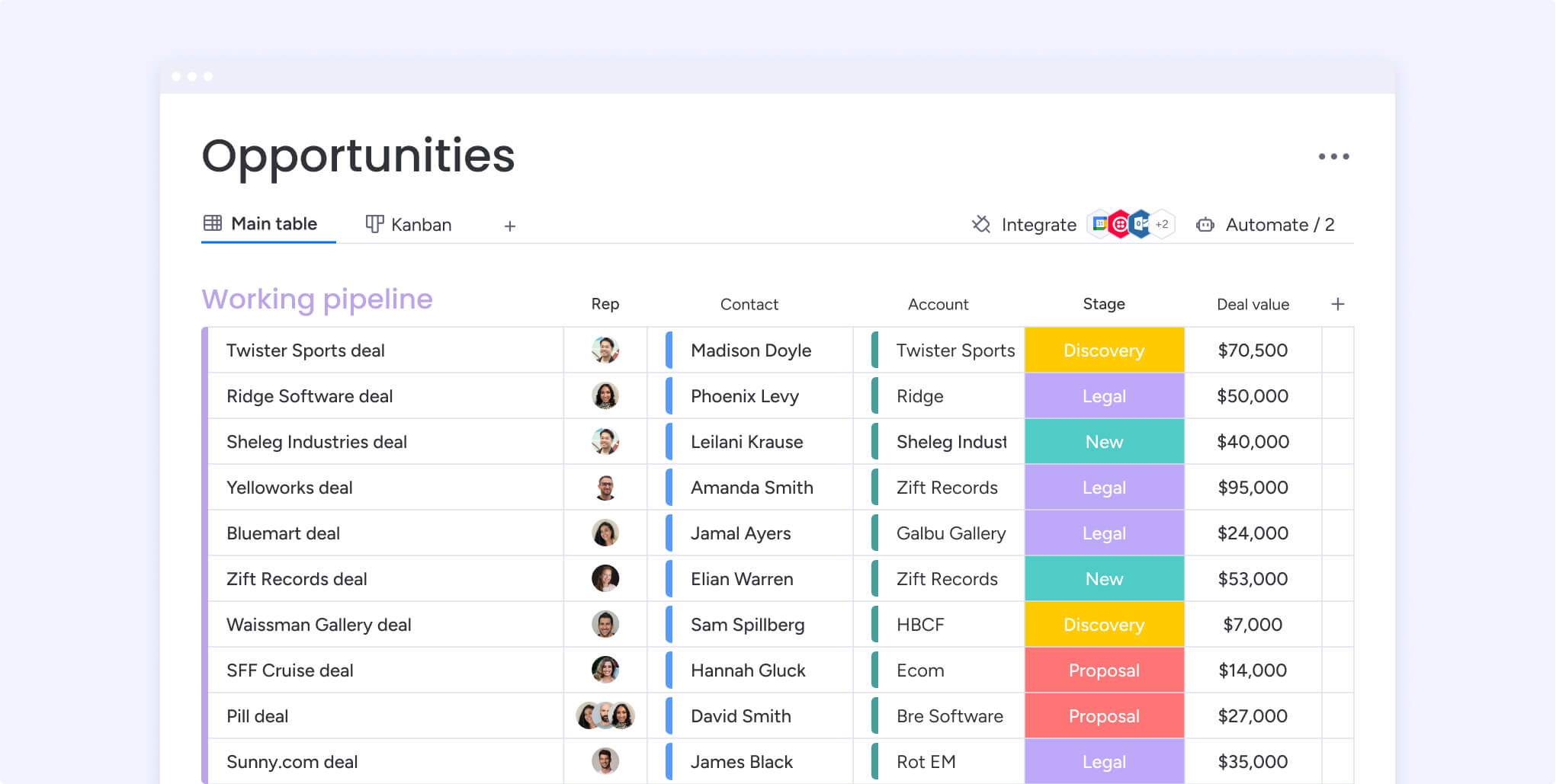
How to choose the right sales performance solution
The selection of a sales platform determines the efficacy of the entire revenue operation. An optimal tool empowers representatives to focus on core competencies, while a suboptimal choice introduces friction that impedes momentum. The objective is to construct a system that accelerates performance, not one that creates organizational impediments.
Strategic evaluation must assess the solution’s integration into the daily workflow. A truly effective platform must connect seamlessly with existing infrastructure, avoiding the creation of new data silos. It must simplify complex processes and scale effortlessly alongside team growth, without demanding significant IT overhead.
Ultimately, the best platform is the one that achieves high team adoption. Modern platforms like monday CRM are both flexible and intuitive, utilizing a no-code foundation. This approach empowers your team to rapidly adapt workflows, ensuring the system grows and evolves with your business objectives.
7 ways to maximize sales performance with AI
AI is not intended to replace your sales team’s efforts. It is designed to supercharge them. AI should be considered as the ultimate strategic tool, shifting sales execution from reactive scrambling to a well-choreographed play: one where every team member is aligned and informed.
- Supercharge strategy with real-time data: AI transforms reactive reporting into a real-time, proactive strategy, empowering your team to make smarter, data-informed decisions instantly.
- Democratize top-performer instincts: AI effectively captures the successful instincts of your highest performers, creating a data-driven playbook accessible to the entire team.
- Translate intuition into actionable insights: by analyzing performance data, AI reveals the underlying “why” behind successful (and unsuccessful) opportunities, replacing guesswork with clear, actionable intelligence.
- Boost rep confidence and prioritization: this insight empowers every representative with the confidence to correctly prioritize deals and apply the most effective strategies to secure them.
- Integrate AI into the Daily Workflow: when these predictive capabilities are woven directly into your daily operations using platforms like monday CRM, the entire execution model improves.
- Automate and predict for focus: the platform automates tedious administrative tasks and predicts which prospects are most likely to convert, clearing the path for reps to focus solely on high-value activities: building relationships and closing revenue.
- Build a faster, smarter sales team: the result is a sales organization that is not only smarter but faster, more aligned, and consistently ready to tackle any target with greater confidence and efficiency.

Try monday CRM to turn performance into progress
Ultimately, the success of any sales platform hinges on a single factor: user adoption. The most sophisticated analytics are rendered useless if reps revert to spreadsheets because the official CRM is too cumbersome. The objective should be to provide a tool that removes administrative drag, allowing the team to dedicate their energy to closing deals.
This principle is central to modern platforms like monday CRM, which combine an intuitive, user-friendly experience with powerful automations designed to scale. When your team can adapt workflows on the fly, you unlock new levels of speed and alignment. They can focus entirely on selling, while leadership gains the clear visibility needed to coach them toward every target.
The goal is not just to implement a new tool, but to fundamentally change the day-to-day work of your sellers: turning your CRM into an engine for growth, not a data entry requirement.
The content in this article is provided for informational purposes only and, to the best of monday.com’s knowledge, the information provided in this article is accurate and up-to-date at the time of publication. That said, monday.com encourages readers to verify all information directly.
Frequently asked questions
Do sales performance management platforms require special training to maintain?
The answer is no. Modern platforms are built for sales teams, not IT, often featuring intuitive drag-and-drop interfaces that require minimal training. This design lets your team focus on selling from day one.
How often should sales teams update quotas and territories in SPM software?
Quotas are typically updated quarterly or annually, while territories can be adjusted in real time as your market or team evolves. A flexible platform allows you to make these changes instantly without disrupting your sales operations.
Can sales performance management software integrate with business platforms beyond CRM systems?
Yes, leading platforms integrate with your entire tech stack — including ERP, marketing, and HR systems — to eliminate data silos. This gives your team a single, unified view of the entire customer journey.
What type of customer support do SPM software vendors typically provide?
Vendors usually provide a mix of implementation guidance, technical support, and training resources. Top providers also offer dedicated customer success management to ensure you're getting the most value from the platform.
How do AI features in SPM platforms handle sensitive sales data privacy?
They use enterprise-grade security like data encryption, role-based access controls, and compliance with standards like SOC 2 and GDPR. This ensures your sensitive sales data remains protected while you leverage AI for automation.
Can small sales teams benefit from SPM platforms or are these designed only for large enterprises?
Absolutely! Many platforms are designed to scale and offer pricing models that are accessible for small but mighty teams. The right tool provides core features like pipeline management and performance tracking that grow with you, without the enterprise-level complexity.


